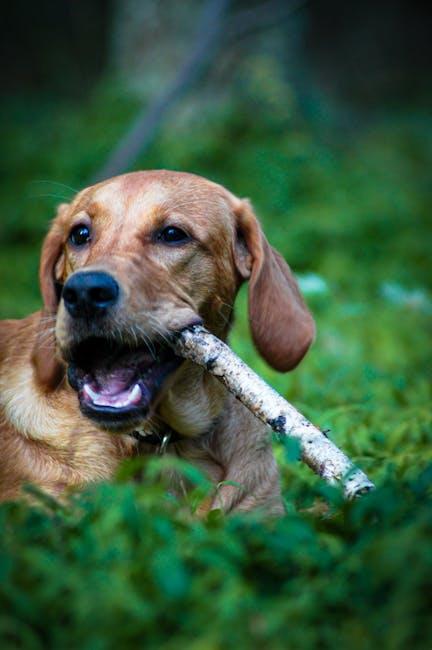Welcoming a furry friend into your home is a journey filled with joy, companionship, and a few unexpected challenges. One such challenge that many dog owners face is the persistent issue of chewing. Whether it’s your favorite pair of shoes, the living room furniture, or anything else within reach, a dog’s urge to chew can sometimes feel overwhelming. But fear not, for understanding the reasons behind this behavior and implementing effective strategies can transform this phase into an opportunity for growth and bonding. In this guide, we’ll explore practical and compassionate techniques to help redirect your dog’s chewing habits, ensuring a harmonious home environment for both you and your beloved pet.
Understanding Why Dogs Chew and How to Redirect Their Energy
Dogs chew for a variety of reasons, ranging from natural instincts to alleviate boredom or stress. Understanding the root cause of this behavior is essential for redirecting their energy positively. Puppies, for instance, chew as part of the teething process, exploring the world with their mouths much like human babies do. Adult dogs might chew to relieve anxiety, seek attention, or simply because they are full of unspent energy. Identifying the underlying motivation can guide you in addressing the behavior effectively.
- Provide appropriate chew toys: Select durable and safe toys that cater to your dog’s chewing style.
- Increase physical activity: Regular walks, play sessions, and mental stimulation can help expend their energy.
- Use deterrents: Apply pet-safe deterrent sprays on furniture or items that your dog frequently targets.
- Create a safe space: Designate a comfortable area where your dog can retreat with their toys.
Redirecting your dog’s chewing habit involves a blend of understanding their needs and providing suitable alternatives. By implementing these strategies, you’ll help your furry friend develop healthier habits while maintaining a harmonious home environment.
Creating a Safe and Stimulating Environment for Your Furry Friend
Ensuring your dog has a safe and stimulating environment is key to preventing destructive chewing. Enrichment is a powerful tool to keep your furry friend engaged and satisfied. Introduce a variety of toys that cater to their natural instincts. Opt for durable chew toys, puzzle feeders, and treat-dispensing toys. Rotate these toys regularly to maintain their interest. Consider adding natural chews like antlers or bully sticks to provide a safe outlet for their chewing needs.
- Safe Spaces: Create a cozy corner or a designated area where your dog can retreat to relax. Fill it with comfortable bedding and familiar scents to make them feel secure.
- Routine Walks and Play: A tired dog is a happy dog. Regular exercise and playtime help burn off excess energy, reducing the urge to chew on inappropriate items.
- Training and Redirection: Teach commands like “leave it” or “drop it” to guide your dog away from forbidden items. Always redirect their attention to an appropriate toy and reward them with praise or treats for making the right choice.
By creating an environment that caters to your dog’s needs, you’ll not only protect your belongings but also foster a loving and trusting relationship with your canine companion.
Training Techniques to Encourage Positive Chewing Habits
- Provide Appropriate Chew Toys: Offer a variety of chew toys to redirect your dog’s energy and satisfy their natural urge to chew. Choose toys that are safe and suitable for your dog’s size and chewing strength. Rotating toys regularly can keep your dog engaged and prevent boredom.
- Positive Reinforcement: Reward your dog when they chew on their toys instead of household items. Use treats, praise, or a favorite game to reinforce this behavior. Consistency is key; every time your dog chooses a toy over your shoes, make sure to acknowledge their good choice.
- Supervised Playtime: Spend time with your dog while they explore their chew toys. This not only strengthens your bond but also allows you to correct any inappropriate chewing immediately. Gently redirect them to a toy and praise them when they make the right choice.
- Create a Chew-Friendly Environment: Keep tempting items like shoes, remote controls, and children’s toys out of reach. A clutter-free environment reduces the chances of your dog finding something they’re not supposed to chew on.
Remember, patience and understanding are vital. Chewing is a natural behavior for dogs, and with the right guidance, they can learn to channel it in a positive way. With time and persistence, you can help your furry friend develop habits that are both safe and satisfying.
Choosing the Right Toys and Chews to Keep Your Dog Engaged
Ensuring your furry friend has the right toys and chews is essential for keeping them engaged and preventing unwanted chewing behavior. When selecting toys, consider your dog’s size, age, and chewing habits. Durable rubber toys are excellent for aggressive chewers, while soft plush toys can be comforting for gentle chewers or puppies. Interactive toys that dispense treats can stimulate your dog’s mind and keep them occupied for longer periods. This not only helps with mental stimulation but also reduces anxiety and boredom, which are common causes of destructive chewing.
Incorporate a variety of textures and types of toys to cater to different chewing needs and preferences. Some popular choices include:
- Natural rubber toys for safe, long-lasting chewing
- Rope toys for tugging and interactive play
- Puzzle toys to challenge their problem-solving skills
- Edible chews for a tasty treat and dental health benefits
Regularly rotating the toys and chews available to your dog can also help maintain their interest and enthusiasm. This variety not only keeps your dog entertained but also helps channel their energy into appropriate outlets, minimizing the chances of them chewing on your favorite pair of shoes.

